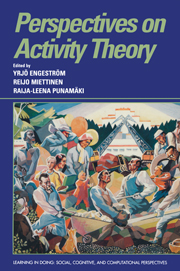Book contents
- Frontmatter
- Contents
- List of contributors
- Series foreword
- Introduction
- Part I Theoretical issues
- 1 Activity theory and individual and social transformation
- 2 The content and unsolved problems of activity theory
- 3 Knowledge as shared procedures
- 4 Activity theory in a new era
- 5 Society versus context in individual development: Does theory make a difference?
- 6 Cultural psychology: Some general principles and a concrete example
- 7 Laws, logics, and human activity
- 8 Collapse, creation, and continuity in Europe: How do people change?
- 9 Activity theory and the concept of integrative levels
- 10 The relevance to psychology of Antonio Gramsci's ideas on activity and common sense
- Part II Language and its acquisition
- Part III Play, learning, and instruction
- Part IV Technology and work
- Part V Therapy and addiction
- Author index
- Subject index
6 - Cultural psychology: Some general principles and a concrete example
Published online by Cambridge University Press: 05 June 2012
- Frontmatter
- Contents
- List of contributors
- Series foreword
- Introduction
- Part I Theoretical issues
- 1 Activity theory and individual and social transformation
- 2 The content and unsolved problems of activity theory
- 3 Knowledge as shared procedures
- 4 Activity theory in a new era
- 5 Society versus context in individual development: Does theory make a difference?
- 6 Cultural psychology: Some general principles and a concrete example
- 7 Laws, logics, and human activity
- 8 Collapse, creation, and continuity in Europe: How do people change?
- 9 Activity theory and the concept of integrative levels
- 10 The relevance to psychology of Antonio Gramsci's ideas on activity and common sense
- Part II Language and its acquisition
- Part III Play, learning, and instruction
- Part IV Technology and work
- Part V Therapy and addiction
- Author index
- Subject index
Summary
Introduction
In an earlier paper, I discussed the uses of cross-cultural research by the originators of the Soviet cultural-historical school. My focus was on the ways in which their ideas intersect with certain streams of American cross-cultural research (Cole, 1988). In that paper I argued that continued progress in developing the ideas of the cultural-historical school would be well served by combining their emphasis on the mediated structure of higher psychological functions and historically evolving modes of activity with the American approach emphasizing the importance of cultural context and empirical methods that begins with an analysis of concrete activity systems.
In this chapter, I begin where my previous discussion left off by presenting various contributions to the elaboration of a cultural theory of human nature that have come to prominence in the past decade under the rubric of cultural psychology. After suggesting some ways in which these efforts complement the basic program of cultural-historical psychologists and their successors who work within the framework of activity theory, I present an example of research designed to apply the overall framework to a concrete problem of development in modern industrial societies.
Recent proposals for cultural psychology
Approximately a decade ago, Douglas Price-Williams (1979, 1980), a well-known cross-cultural developmental psychologist, published two papers suggesting that psychologists recognize the existence of cultural psychology, which he denned as “that branch of inquiry that delves into the contextual behavior of psychological processes” (1979, p. 14).
- Type
- Chapter
- Information
- Perspectives on Activity Theory , pp. 87 - 106Publisher: Cambridge University PressPrint publication year: 1999
- 31
- Cited by



